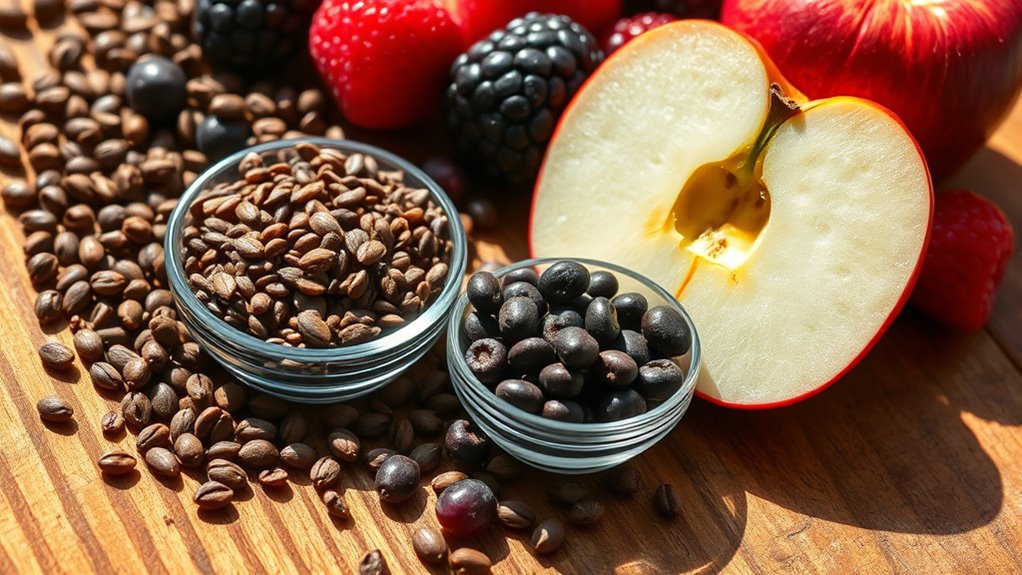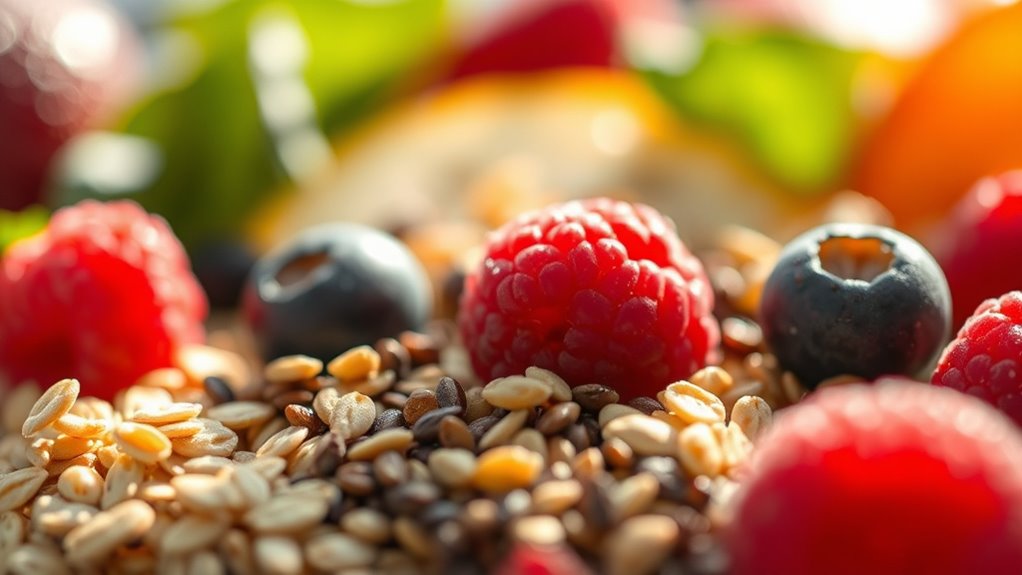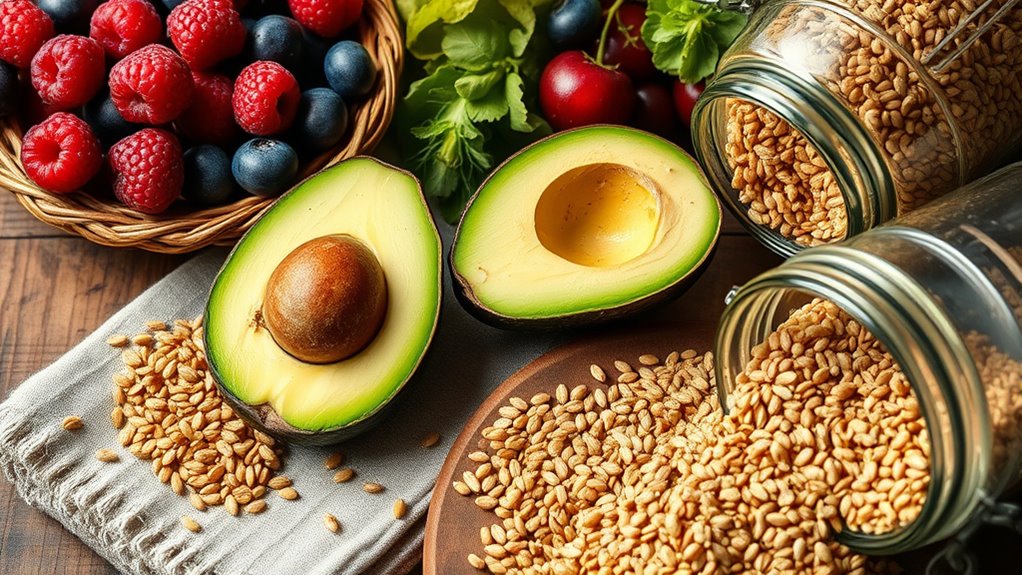Fiber is essential for your gut health and feeling full longer. It comes in soluble types, which ferment in your gut to support digestion and lower cholesterol, and insoluble types, which add bulk and prevent constipation. Eating enough fiber helps balance your microbiome, improves digestion, and promotes satiety, aiding weight management. Incorporating diverse fiber sources from foods or supplements can boost these benefits. Explore more ways fiber supports your health and how to optimize your intake.
Key Takeaways
- Dietary fiber, including soluble and insoluble types, promotes gut health by supporting beneficial bacteria and digestive regularity.
- Soluble fiber lowers cholesterol, stabilizes blood sugar, and enhances satiety, aiding in weight management.
- Insoluble fiber adds bulk to stool, preventing constipation and supporting smooth digestion.
- Fiber increases feelings of fullness by slowing digestion and stimulating satiety hormones, helping control hunger.
- Gradually increasing fiber intake from whole foods or supplements improves gut function and overall health.
What Is Dietary Fiber and Why Is It Important?

Dietary fiber refers to the parts of plant foods that your body can’t digest or absorb. Instead, it passes through your digestive system largely intact, which is vital for fiber fermentation in your gut. This process produces beneficial compounds like short-chain fatty acids that support your gut microbiome, the community of microorganisms living inside you. A healthy microbiome helps improve digestion, boosts your immune system, and even influences your mood. Without enough fiber, your gut struggles to stay balanced, leading to issues like constipation and inflammation. Consuming fiber-rich foods encourages the growth of good bacteria, strengthening your gut health. Additionally, incorporating a variety of fiber sources can enhance overall nutritional intake and promote long-term gut health. Engaging in mindful eating practices can also help you better recognize your body’s satiety signals, preventing overeating and supporting digestive comfort. Recognizing the importance of dietary fiber can motivate you to make healthier food choices for your overall well-being. Including prebiotic fibers in your diet can further support beneficial bacterial growth. In short, dietary fiber isn’t just about regularity; it’s essential for maintaining a thriving gut microbiome and overall well-being.
Different Types of Fiber: Soluble and Insoluble

You’ll find that soluble fiber can help lower cholesterol and stabilize blood sugar levels, making it great for heart health. Insoluble fiber, on the other hand, adds bulk to your stool and keeps your digestive system moving smoothly. Foods like oats and fruits are rich in soluble fiber, while whole grains and vegetables provide plenty of insoluble fiber. Additionally, incorporating chia seeds can support digestive health through their soluble fiber content, helping to form a gel-like substance that promotes regularity. Incorporating fiber-rich foods into your diet can also foster a balanced gut microbiome, further supporting overall digestive health. Heart health benefits are often associated with adequate fiber intake, emphasizing its importance in a comprehensive wellness plan. Filtration technologies in air purifiers can also help reduce airborne pollutants that may impact respiratory health.
Soluble Fiber Benefits
Have you ever wondered why soluble fiber is often praised for its health benefits? It mainly works through fiber fermentation, where beneficial bacteria in your gut microbiome break down soluble fibers. This process produces short-chain fatty acids that support your gut lining, improve digestion, and help regulate blood sugar levels. fiber fermentation also promotes satiety, making you feel full longer, which can aid in weight management. Additionally, it helps lower LDL cholesterol, reducing your risk of heart disease. By nourishing your gut microbiome, soluble fiber strengthens your digestive health and boosts immunity. Regular intake can lead to more consistent bowel movements and fewer issues with constipation. Incorporating a variety of fiber-rich foods can also support nutritional diversity, enriching your overall nutrition. The diversity of fiber sources can also influence gut microbiota diversity, which is essential for a resilient and healthy microbiome. Furthermore, a diverse intake of fiber can be particularly beneficial during seasonal variations, helping your body adapt to changing dietary needs. Overall, soluble fiber offers a powerful boost to your gut health and overall well-being.
Insoluble Fiber Sources
Insoluble fiber is found in many plant-based foods and plays a crucial role in maintaining healthy digestion. Foods like whole grains, nuts, seeds, and the skins of fruits and vegetables are excellent sources of insoluble fiber. If you need a boost, insoluble fiber supplements can help you meet your daily goals, especially if your diet is lacking in these foods. These supplements provide more bulk to your stool, promoting regularity and preventing constipation. Incorporating insoluble fiber sources into your diet is simple—add whole grains or seeds to meals or choose fiber supplements designed specifically for insoluble fiber. By doing so, you support digestive health and ensure your gut functions smoothly. Self Watering Plant Pots can be a helpful tool to maintain proper hydration when trying to optimize your diet for fiber intake. Always balance your intake of soluble and insoluble fiber for maximum benefits. Additionally, understanding the different types of fiber can help you tailor your diet for optimal gut health and satiety.
How Fiber Supports Digestive Health

Ever wondered how fiber contributes to better digestion? It all starts with fiber fermentation. When you consume fiber, especially soluble types, your gut microbiome breaks it down through fermentation, producing beneficial compounds like short-chain fatty acids. These compounds help nourish your gut lining and promote regular bowel movements. Fiber acts as a prebiotic, supporting the growth of good bacteria in your gut microbiome, which is essential for healthy digestion. By maintaining a balanced microbiome, fiber helps prevent issues like constipation, bloating, and digestive discomfort. It also encourages the production of mucus that protects your intestinal walls. In short, fiber’s role in fermentation and microbiome health is crucial for keeping your digestive system functioning smoothly and efficiently. Additionally, incorporating the right type of fiber can enhance comfort and support solutions for your digestive health.
Fiber’s Role in Regulating Blood Sugar Levels

Building on how fiber supports a healthy gut, it also plays a significant role in managing blood sugar levels. Fiber helps slow digestion, leading to steadier blood sugar regulation. This process improves your insulin sensitivity, making your body better at using insulin to control glucose. Here are three ways fiber assists in this: 1. Slows carbohydrate absorption, preventing spikes in blood sugar. 2. Enhances insulin response, promoting better blood sugar control. 3. Forms a gel-like substance** in your digestive tract, smoothing out fluctuations. Additionally, prebiotic fibers can be a fun way to personalize your pet’s identity, just as choosing the right fiber can personalize your health**.
The Connection Between Fiber and Heart Health

When you include more fiber in your diet, you can help lower your cholesterol levels and support better heart health. Fiber also improves the function of your blood vessels, making circulation more efficient. These benefits work together to reduce your risk of heart disease and keep your heart stronger.
Cholesterol Reduction Benefits
Fiber plays a crucial role in lowering bad cholesterol levels, which can markedly reduce your risk of heart disease. When you include fiber supplements or consume fiber-rich foods, your body promotes fiber fermentation in the gut. This process helps bind cholesterol in the digestive system, removing it before it enters your bloodstream. To maximize these benefits, focus on: 1. Increasing soluble fiber intake through foods or supplements 2. Supporting fiber fermentation for better cholesterol binding 3. Maintaining consistent fiber consumption for sustained heart health. Additionally, Effective wall organization can also create a visually appealing environment that encourages healthy habits and enhances overall well-being. Incorporating organized storage in your kitchen and pantry can make it easier to include high-fiber foods in your daily diet, supporting long-term heart health. Moreover, understanding how gut health influences digestion and nutrient absorption can further optimize your dietary choices. Incorporating a variety of fiber sources can also improve your digestive health and overall nutritional balance.
Improved Vascular Function
Research shows that fiber directly benefits your vascular health by improving the flexibility and function of your blood vessels. When you include enough fiber in your diet, it helps your blood vessels stay supple, reducing stiffness and supporting ideal blood flow. Better vascular health means your heart receives oxygen and nutrients more efficiently, lowering your risk of cardiovascular issues. Soluble fiber, in particular, can help reduce inflammation and prevent plaque buildup in your arteries. As your blood vessels become healthier and more responsive, your overall circulation improves, which can boost energy levels and reduce the risk of hypertension. Incorporating fiber-rich foods into your daily routine is a simple yet effective way to support your vascular health and promote a strong, healthy heart. Additionally, psychological principles can provide personalized guidance on integrating fiber-rich foods into your lifestyle for optimal benefits.
Enhancing Satiety: How Fiber Helps Control Appetite

Because it slows down digestion and adds bulk to your meals, fiber plays a crucial role in increasing feelings of fullness. When you consume fiber-rich foods, your stomach stretches more, signaling satiety hormones that curb hunger. This helps you eat less overall and supports weight management.
Here are three ways fiber enhances satiety:
- It prolongs digestion time, keeping you full longer.
- It stimulates satiety hormones like PYY and GLP-1, which suppress appetite.
- It stabilizes blood sugar levels, preventing sudden hunger spikes.
Food Sources Rich in Fiber

Incorporating fiber-rich foods into your diet is an effective way to boost your intake and enjoy their satiety benefits. Whole grains like oats, brown rice, and whole wheat bread are excellent sources that add bulk to your meals while supporting digestion. Legume varieties such as lentils, chickpeas, black beans, and kidney beans are also packed with fiber and protein, making them a filling addition to salads, soups, and stews. These foods not only help you feel full longer but also promote gut health by feeding beneficial bacteria. Including a diverse range of whole grains and legumes ensures you get both soluble and insoluble fiber, which work together to improve digestion and support overall well-being. Start adding these fiber-rich options to your meals today.
Tips for Increasing Your Daily Fiber Intake

To increase your daily fiber intake, start by gradually adding more fiber-rich foods to your meals to prevent digestive discomfort. This allows your body to adjust smoothly. Consider these tips:
- Incorporate fiber snacks like nuts, seeds, or dried fruits into your day for a quick boost.
- Use fiber supplements, such as powders or bars, if you find it hard to meet your goals through food alone.
- Replace refined grains with whole grains—think whole wheat bread or brown rice—to naturally increase fiber.
Common Myths and Facts About Dietary Fiber

Many people believe they understand dietary fiber, but myths and misconceptions can lead to confusion about its true benefits and effects. One common myth is that all fiber is the same, but fiber fermentation varies depending on the type—soluble fibers ferment more readily, promoting gut health. Some think fiber supplements are just as effective as whole foods, yet they often lack the diverse nutrients found in natural sources. It’s also believed that increasing fiber intake causes bloating and discomfort for everyone; however, gradual increases typically minimize side effects. Remember, fiber plays a key role in satiety and gut health, but understanding the differences between dietary fiber and fiber supplementation helps you make informed choices. Not all fibers are created equal, so choose wisely.
Frequently Asked Questions
Can Fiber Supplements Replace Dietary Fiber From Food Sources?
Fiber supplements can help boost your fiber intake, but they shouldn’t fully replace dietary sources. While fiber supplement efficacy varies, whole foods like fruits, vegetables, and grains offer additional nutrients and benefits that supplements can’t match. If you prefer dietary sources, you’ll get more than just fiber—you’re also supporting overall health. Relying solely on supplements may miss out on these essential nutrients, so balance is key for ideal gut health and satiety.
How Does Fiber Affect Gut Microbiota Diversity?
You might wonder how fiber affects gut microbiota diversity. When you consume fiber, it provides prebiotic effects that promote beneficial bacteria growth. This enhances microbial balance, leading to a more diverse and resilient gut microbiome. A diverse microbiota supports better digestion, immunity, and overall health. So, increasing your fiber intake, especially from whole foods, can positively influence your gut bacteria and overall gut health.
Are There Any Risks Associated With Consuming Too Much Fiber?
You might wonder if consuming too much fiber could cause problems. A fiber overdose can lead to digestive issues like bloating, gas, and constipation. Eating excessive fiber too quickly or without enough water increases these risks. To stay safe, gradually increase your fiber intake and drink plenty of fluids. Moderation is key to enjoying fiber’s benefits without experiencing discomfort or digestive issues.
Does Fiber Intake Influence Mental Health or Mood?
Fiber’s role in mood regulation is like a bridge connecting gut health to mental well-being. Consuming enough fiber can help reduce anxiety and stabilize your mood by supporting healthy gut bacteria. When your gut functions well, it produces mood-boosting chemicals that keep your spirits steady. So, yes, fiber intake can influence your mental health, acting as a quiet partner in maintaining emotional balance and overall happiness.
How Does Fiber Interact With Common Medications?
You should know that fiber can affect how your medications work. It can bind to certain drugs, reducing their absorption, so it’s best to take medications at different times from high-fiber meals or supplements. Keep in mind that fiber intake may alter medication effectiveness, so always follow your healthcare provider’s guidance on timing and dosage to avoid interactions and ensure proper absorption.
Conclusion
By now, you see how fiber is truly the superhero of your gut and overall health. Adding more fiber-rich foods can revolutionize your digestion, stabilize blood sugar, and keep hunger at bay like nothing else. Don’t underestimate its power—fiber can transform your wellbeing faster than you’d believe. So, start making smarter choices today, and watch your health soar to heights you never thought possible. Your gut will thank you—trust us, it’s a game-changer!










